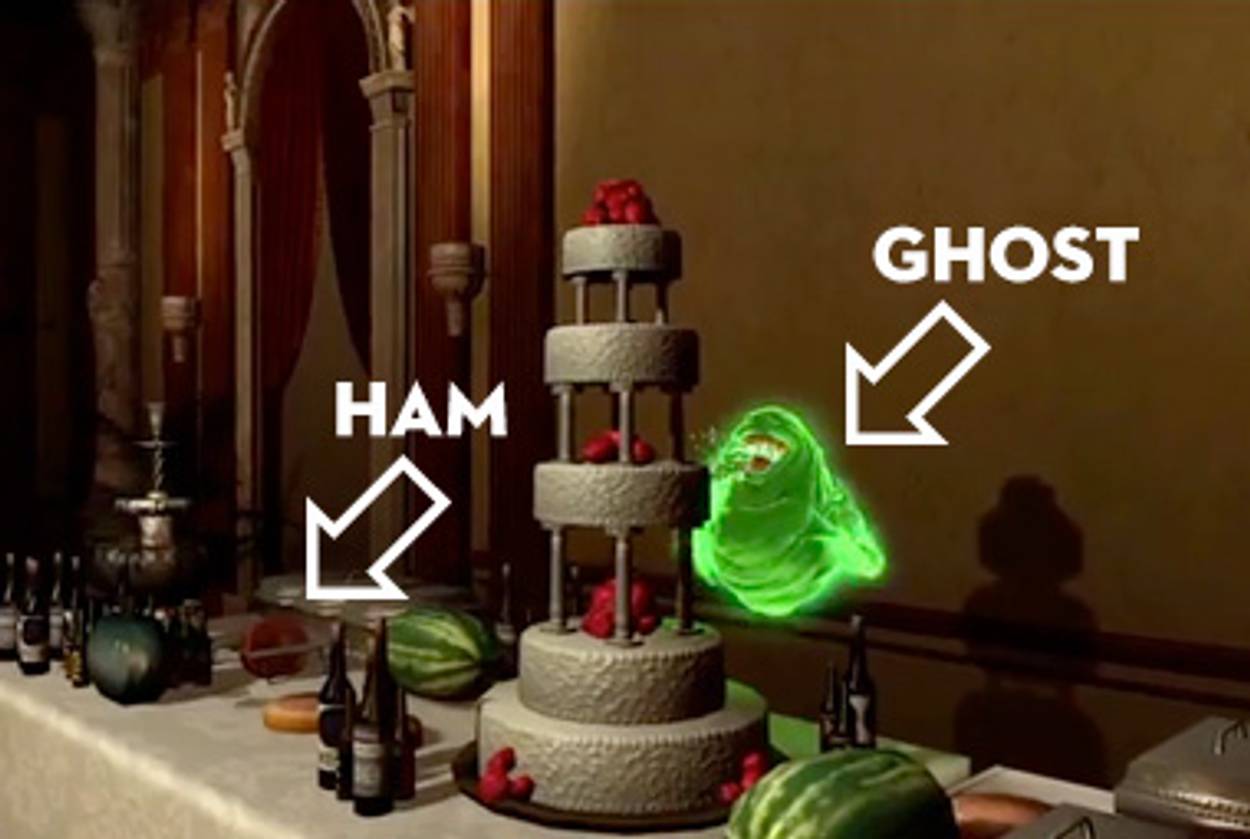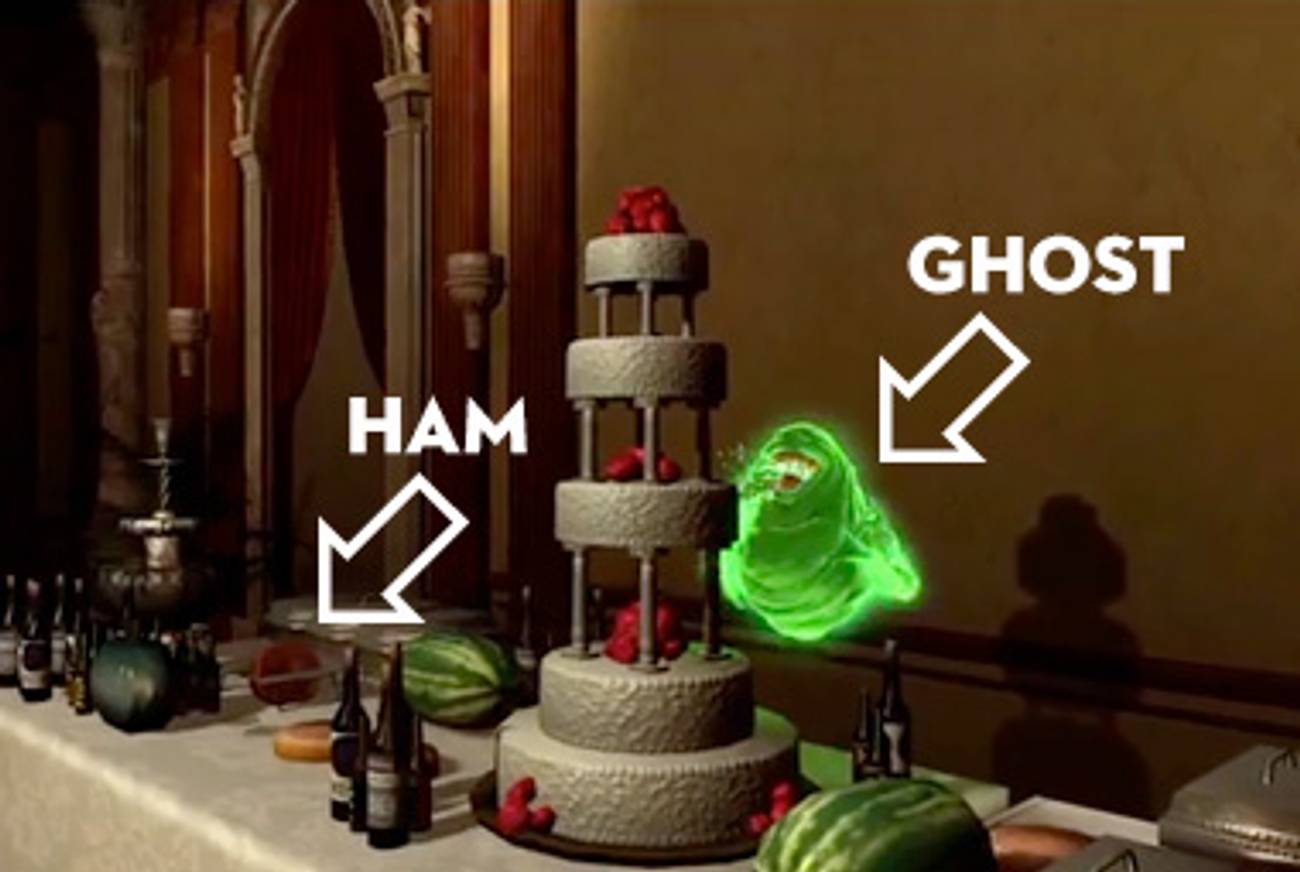‘Ghostbusters: The Video Game,’ is Based on the 1984 Film Co-Written By Harold Ramis
Haunted Ham: The new ‘Ghostbusters’ videogame rewards the kosher




It was going to be a Shabbat to remember. After a long week of work at Tablet Magazine, I was looking forward to leaving the Jews behind and focusing instead on the ghosts. I left the office Friday afternoon, dashed over to my favorite video game store, and bought a copy of “Ghostbusters: The Video Game,” the newly released title that’s currently the hottest property for joystick jockeys everywhere.
My hands quivered as I inserted the disc into my gaming console. I revere Ghostbusters, the 1984 Ivan Reitman comedy, the way some men worship sports teams, rock bands, or organized religions. I quote it often. I think about it frequently. I sometimes pass by 14 N. Moore Street in Manhattan just to look at the firehouse that served as Ghostbusters HQ in the film. A chance to play as a new Ghostbusters’ recruit, to slap on a proton pack and blast some ghouls, felt less like a game and more like a childhood dream come true.
After completing a short training session, I found myself joining Dr. Peter Venkman (voiced in the game, as in the original film, by the peerless Bill Murray) in the lobby of the Sedgwick Hotel. Slimer, the green and gluttonous ghost, had escaped from captivity, and found his way back to his old haunt, seeking refreshments in the hotel’s luxurious ballroom. But the hotel’s manager, a pixelated persnickety dude, told Venkman and me that the ballroom was off limits. The Rodriguez bar mitzvah was about to begin, and, ghost or no ghost, the hotel couldn’t risk alienating its customers.
As Venkman snuck us in through the kitchen, blasting everything in sight with his proton beam, my mind wandered. The Rodriguez bar mitzvah? Sure, I thought, there were probably Jews named Rodriguez, but why choose such an atypical name in a medium not usually given to nuance? Finally finding my way into the hall, I realized that their last name wasn’t the only thing that made the Rodriguez’s simcha unusual: there on the buffet table, right next to the wine bottles and the silver candlesticks, were a few huge chunks of honey-glazed ham.
I froze in my tracks. It was time, I realized, to make a major decision about my identity. Was I a Jew first and a Ghostbuster second? Or was it the other way around? Do I catch the ghost? Or do I take care of the treyf? My heart beat fast. Then, suddenly, I knew just what I needed to do.
Ignoring Venkman’s repeated pleas to help him with the manic Slimer, I walked decisively over to the buffet. I took my time, making sure my aim was just right. Then, I pressed the button, and blasted the offensive ham into smithereens. I stopped and smiled. But what happened next left me astonished: a bright-colored tag popped up on the upper left-hand corner of the screen. I had accomplished, the game informed me, one of its many hidden mini-missions, little puzzles meant to keep gamers on their toes and help them score more points. “Achievement unlocked,” read the tag, followed by one more unexpected word: “Kosher!”
So the mission, I thought with amazement, wasn’t just about capturing the fugitive apparition. It was also about making sure the Rodriguezs enjoy a halachically proper party.
I refocused my beam on Slimer with renewed zeal. My heart was at ease. In this strange and wonderful game, I realized, busting ghosts and blasting pork were just two sides of the same coin. I was a Jew and a Ghostbuster, just like I always wanted to be.
Liel Leibovitz is a senior writer for Tablet Magazine and a host of the Unorthodox podcast.
Liel Leibovitz is editor-at-large for Tablet Magazine and a host of its weekly culture podcast Unorthodox and daily Talmud podcast Take One. He is the editor of Zionism: The Tablet Guide.